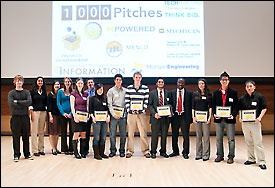Ear plugs with a built-in alarm clock. Portable solar energy for developing countries. A plan to run university buses on leftover cafeteria cooking oil. These are just a few of the winning ideas from this year’s 1,000 Pitches student entrepreneurship competition at U-M.
The nine winners were announced at a ceremony last week. During the two-month contest, students from across campus submitted 2,165 ideas for new products, businesses or social ventures. Organizers believe it is the largest pitch contest in the world.

“Changing the state will start with great ideas, and that’s what this competition is about,” says Thomas Zurbuchen, associate dean for entrepreneurial programs at the College of Engineering. “The entrepreneurial spirit at Michigan is growing in scope and depth and this is truly amazing.”
Students competed in nine categories: environmental, social entrepreneurship, global business, green campus, health, local business, Michigan matters, high-tech and best iPhone app. This is the second year of 1,000 Pitches, which is organized by the student group MPowered Entrepreneurship.
The winners are:
Health: Whitney Hovan, a graduate engineering student, and her colleagues pitched a new medical device that improves upon the current methods of removing blood clots in stroke victims. Their device includes a separator to break up the clot, a suctioning device to remove the pieces and a net to stop them from traveling into the brain. Several neurosurgeons have agreed to mentor the students, whose company is called Emboless.
Best iPhone app: Liying Huang, a junior business student, imagines a coupon application that allows shoppers to scan a barcode and receive manufacturer’s coupons on their smartphones. Quick Coupons would be a coupon database and an interactive search engine that learns a shopper’s preferences and provides discounts on competing as well as complimentary products. Shoppers would scan their phones at the register to receive discounts.
Green campus: Daniel Forhan, a sophomore engineering student, wants to turn used vegetable oil from the university’s cafeterias into biodiesel for campus buses. He estimates that this could save $40,000 per year after a refiner is purchased.
Social entrepreneurship: David Sheng, a junior engineering student, has a low-cost solution for people without clean water in developing nations. His “cheap water condenser kit” condenses water from the air and drips it into a basin.
Environment: Md. Shahnoor Amin, a graduate student in engineering, proposes a portable energy solution for developing countries. A native of Bangladesh, he remembers studying long hours under a kerosene lamp because there was no electricity for miles. His company, June Energy, is developing a portable solar-powered device that costs $10 per household and could provide lighting at night and electricity for small electronics such as cell phones.
High-tech: Hannah Selonick, a sophomore engineering major, pitched a vibrating metronome to help musicians keep time while they’re playing. A violinist, Selonick says it’s sometimes hard to hear her conventional metronome over the music. Her vibrating version could be worn on the arm to help musicians feel the beat. It would include a sync feature so members of an ensemble could set theirs to the same rhythm.
Michigan matters: Allen Kim, a junior engineering major, conceives of the Renewable Energy Science Foundation. This government-funded institute would leverage the state’s natural gas and wind resources and advanced battery technology to attract more renewable energy entrepreneurs. He asks the state’s legislators to propose an industrial development act to alleviate state business taxes for renewable energy entrepreneurs.
Global business: Eleanor Pryser, a freshman engineering major, came up with “ear buddies,” ear plugs with a built-in alarm clock. Designed for use in noisy environments, they could block out snores or a roommate’s alarm clock. They could also be used by those who don’t want their alarms to bother others in the area.
Local business: Tim Lewis, a junior business major, envisions Annarbortonight.com, an Ann Arbor entertainment and nightlife news Web site. Bars, restaurants and other destinations and venues would post information free, though they would be encouraged to buy ads to get their information highlighted. Reviewers could write about and rate the different destinations.
MPowered students chose 10 finalists in each category, then an expert in the field of each category chose the winner. Each winner received a $1,000 prize.
“I think this was an extremely successful competition,” says MPowered President Lauren Leland.
For more information about 1,000 Pitches, go to 1000pitches.com.
Sponsors include the College of Engineering, Rackham Graduate School, the School of Information, Green Mountain Energy, Arboretum Ventures, Menlo Innovations and others.

